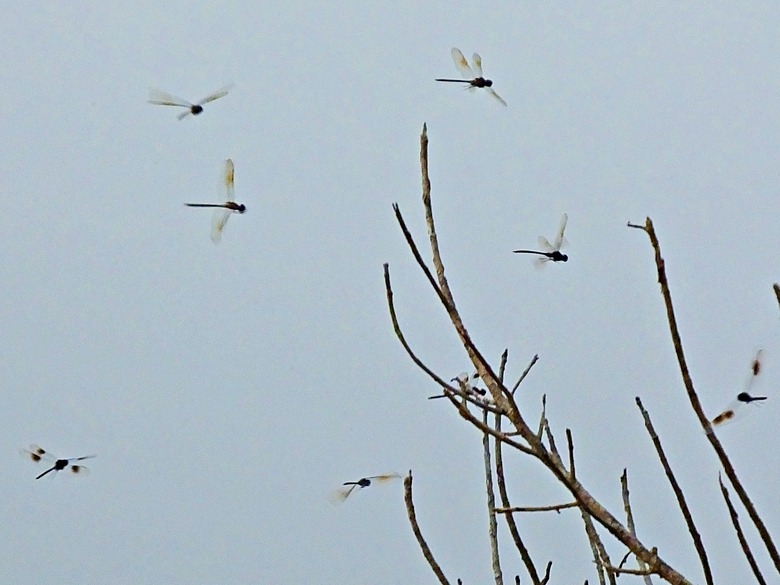Why Are The Barn Swallows & Dragonflies Swarming?
When you step out onto your lawn in the summertime, you're likely to notice the warm sunshine, the birds chirping and a dragonfly or two flitting through the sky. But occasionally, you might notice unusually large numbers of dragonflies swarming. So much so that you might ask yourself, 'Why are there so many dragonflies in my yard?' The same can also be said for the swift-flying barn swallows.
Both of these creatures move quickly on the wing, but that's about where their similarities seemingly end. However, you might be surprised to find that dragonflies and barn swallows often congregate in large numbers for the exact same reason!
Why Do Dragonflies Swarm?
Why Do Dragonflies Swarm?
Dragonflies have a voracious appetite and incredible skill in the air to match. These creatures are one of the most lethal hunters on the planet – if you're a small insect, that is! Adult dragonflies can skillfully capture a wide range of insect prey straight out of the sky, including butterflies, mosquitoes, flies and moths.
This prey preference helps answer the question 'Why do dragonflies swarm?' During warm, sunny days, dragonflies congregate in their preferred hunting grounds of meadows, open fields and areas close to the water to hunt their abundant insect prey. When food is aplenty, you'll find many dragonflies taking advantage of the feast.
Why Do Barn Swallows Swarm?
Why Do Barn Swallows Swarm?
A graceful and agile barn swallow in flight is a sight to behold. These birds have skillful flying abilities similar to dragonflies because they feed on the same type of prey! Barn swallows readily hunt for mosquitoes, moths, bees and butterflies. Just like dragonflies, when insect prey is plentiful you're likely to find plenty of barn swallows flying in search of it above grassy fields and meadows.
When Do Dragonflies and Barn Swallows Swarm?
When Do Dragonflies and Barn Swallows Swarm?
Whether you're watching a barn swallow flying along the tree line at your local park or a dragonfly zipping above your rhododendrons after mosquitoes, prey activity increases around the same time for both dragonflies and barn swallows. This means that both dragonflies and barn swallows can swarm around the same time when their insect prey is at its peak in population numbers.
For example, mosquito populations are highest during the warm, humid months of the summertime, particularly in regions with colder winter seasons. Mosquito populations also boom after periods of heavy rainfall, when humidity levels increase and standing water makes favorable breeding habitats plentiful. More mosquitoes mean more food for dragonflies and swallows!
A Bit of Friendly Fire
A Bit of Friendly Fire
Because both of these creatures hunt the same type of prey, it might not surprise you to find that dragonflies and barn swallows can cross paths from time to time during their search for prey. Unfortunately for the dragonflies, barn swallows aren't particular about their meals and are more than happy to scoop up a dragonfly snack, fellow insect predator or not!
In the battle between dragonfly and barn swallow, the dragonfly still puts up a fair fight – or rather, flight. Though they might not have the ability to fend off the larger barn swallow, dragonflies can certainly hold their own in a flying contest. Their best bet for survival is outmaneuvering the barn swallow and hoping they have the upper hand (or wing) in their flight skills!
Do Barn Swallows Migrate?
Do Barn Swallows Migrate?
Another important consideration in the swarming of barn swallows is their yearly migratory patterns. Not only do swallows migrate, but barn swallows travel across long distances to do so. As wintertime approaches and the weather cools, barn swallows in North America begin to congregate and fly south for warmer over-wintering grounds. They spend their winter in Central and South America before returning to North America in the spring.
References
Cite This Article
MLA
Zinni, Yasmin. "Why Are The Barn Swallows & Dragonflies Swarming?" sciencing.com, https://www.sciencing.com/why-are-the-barn-swallows-dragonflies-swarming-13424531/. 30 September 2021.
APA
Zinni, Yasmin. (2021, September 30). Why Are The Barn Swallows & Dragonflies Swarming?. sciencing.com. Retrieved from https://www.sciencing.com/why-are-the-barn-swallows-dragonflies-swarming-13424531/
Chicago
Zinni, Yasmin. Why Are The Barn Swallows & Dragonflies Swarming? last modified March 24, 2022. https://www.sciencing.com/why-are-the-barn-swallows-dragonflies-swarming-13424531/
